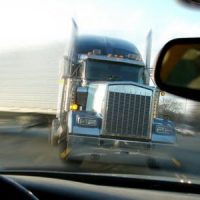Recovering Damages After A Jackknife Accident

Anyone who has pulled a trailer or a boat behind their vehicle knows how easy it is to accidentally “jackknife.” The dangers of jackknifing are even higher for drivers of commercial vehicles, as these trucks carry extremely heavy loads and often travel at high speeds. Tragically, jackknife accidents tend to be extremely dangerous for other motorists, accounting for nearly 10 percent of all truck-related fatalities.
What Qualifies as a Jackknife Accident?
A jackknife accident occurs when the trailer portion of a truck separates from the cab, swinging out to create a 90 degree angle between the two pieces. The term “jackknife” references the way that these accidents resemble a pocket knife that has been partially opened. Because of the way they are constructed (with separate trailers), many commercial trucks are at risk of jackknifing. However, some trucks are more likely than others to jackknife. A driver who drastically reduces speed while hauling a particularly heavy load of cargo is, for instance, much more likely to jackknife, as the cab of the truck will stop, but the trailer, due to its heavier weight, may keep moving forward, pivoting where it meets the cab.
Why are Jackknife Accidents So Dangerous?
Although they may seem less dangerous than other kinds of truck accidents, jackknife accidents can have devastating consequences for other drivers on the road. Jackknifing trailers, for instance, often strike other cars when they swing out into traffic. Jackknifing trucks are also much more likely to overturn, increasing the risk of cargo spills and multi-car pile-ups. Once the vehicles do finally come to rest, they often block multiple lanes of traffic, further increasing the chance of a multi-vehicle collision.
What Causes Jackknife Accidents?
Most jackknife accidents are the result of driver error. However, many have also been linked to a number of other factors, including:
- Poor road conditions, like wet pavement, crumbling asphalt, or potholes;
- Heavy traffic, which can cause drivers to attempt to brake too quickly;
- Defective mechanical parts, such as the sudden failure of a vehicle’s braking system;
- Cargo that hasn’t been loaded properly; and
- Poor weather conditions, which can both impede visibility and lead to dangerously slick roads.
Although truck drivers are specifically trained to account for these kinds of factors by driving slowly, conducting regular maintenance, following strict protocols when loading cargo, and avoiding the roads during storms, many fail to take these precautions. When this happens, injured parties are often able to seek compensation for their accident-related losses from the trucking company itself.
Reach Out to an Experienced Tampa Truck Accident Lawyer for Help
Whatever the cause of the jackknife accident in which you were involved, the results may have left you struggling with serious injuries, hefty medical bills, and significant property damage. If you need help seeking compensation for these, and other accident-related losses, don’t hesitate to call us at 813-251-0072 and set up an initial consultation with the dedicated Tampa truck accident lawyers at Anderson & Anderson today.
Sources:
cdc.gov/mmwr/preview/mmwrhtml/mm6016a2.htm
fmcsa.dot.gov/sites/fmcsa.dot.gov/files/docs/Vehicles-tbl8-2012.xls
